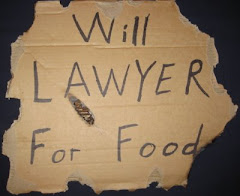I've come to realize that my posts are lacking a certain amount of polish and coherence, so I have decided to make an effort to post more often and to make my posts more pithy and generally more intelligent. After all, I can write very well when I put for the effort.
Now, some more on bankruptcy exemptions.
The Illinois Homestead Exemption, or . . .
punishing those who actually try to pay for their homes.
I touched on this topic with my last post. Bankruptcy clients in the current real estate market (read: down the drain and minced in the garbage disposal) either have (a) zero equity or negative equity, or (b) a ton of equity.
Rarely is there a situation, in my experience, were a debtor has, say, $50k in equity. Most often, in those situations, the debtor would have already tapped that with a HELOC or other form of second mortgage. While practical in theory, these "debt consolidation" 2nd mortgages are just a way to eat into home equity while preserving the unsecured lines of credit that debtors horribly mismanaged in the first place and will quickly resume to horribly mismanage.
In Illinois, the homestead exemption is $15,000 for an individual, and $30,000 for a married couple. Federal exemptions are worth $20,200 , and the rest very by state. Some are as high as $100k or even unlimited (Arizona and Texas, respectively).
So, in general, Illinois has dinky exemptions.
As a policy standpoint, these exemptions do not encourage people to build equity in property, since it it easy to lose your home in the event of misfortune. I had a client who had over $100k in equity, but minimal income sufficient only to pay the small mortgage on the property. The debt level was median, between $40k and $75k, with a judicial lien.
If she had been mortgaged to the hilt, we could have filed ch. 7, avoided the judicial lien, and made her life easy as pie. Instead, she's looking at a 100% repayment ch. 13 at over a $1,000 a month (unfeasible and unaffordable). Or she can sell the house and loose that which she struggled long and hard for.
The results are simply not fair and, more importantly, do not serve the purpose of bankruptcy. One's home is one's castle, and, unfortunately in Illinois, your gate is down if you have equity.
Reflections
11 months ago
.jpg)



No comments:
Post a Comment